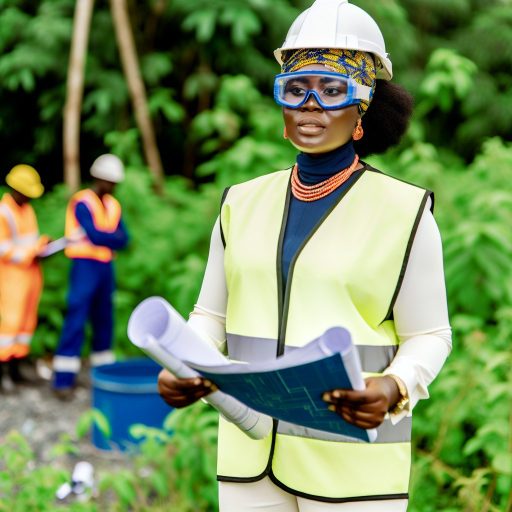Introduction:
Nigerian rural areas face environmental challenges such as deforestation and water pollution.
Implementing environmental management technologies is crucial for sustainable rural development in Nigeria.
Overview of Current Environmental Management Practices in Nigerian Rural Areas:
Most rural areas in Nigeria lack proper waste management systems.
Open defecation is a common practice in many rural communities.
There is a lack of awareness about the importance of environmental conservation.
Illegal logging and deforestation are widespread in rural areas.
Water pollution from untreated sewage is a major issue.
Challenges Faced in Implementing Effective Environmental Management Strategies:
- Lack of funding for environmental projects in rural communities.
- Limited capacity and expertise in environmental management among local authorities.
- Resistance to change and lack of community involvement in environmental initiatives.
- Inadequate enforcement of environmental regulations in rural areas.
- Climate change impacts are exacerbating environmental challenges in rural areas.
Need for Innovative Solutions to Address Environmental Issues:
- Promoting sustainable agriculture practices to reduce environmental degradation.
- Empowering local communities through education and training on environmental management.
- Introducing renewable energy technologies to rural areas to reduce reliance on fossil fuels.
- Implementing community-led conservation projects to protect natural resources.
- Collaborating with international organizations and NGOs to support environmental initiatives in rural areas.
Importance of technology in environmental management for rural development:
Technology plays a crucial role in environmental management for rural development.
It provides innovative solutions to address various environmental challenges.
By harnessing technological advancements, rural communities can effectively monitor and mitigate environmental issues.
This creates sustainable development pathways.
Role of technology in monitoring and addressing environmental issues:
- Remote sensing technology allows for real-time monitoring of land use changes, deforestation, and water quality in rural areas.
- IoT devices can track air pollution levels and identify sources of contamination, enabling prompt interventions to improve air quality.
- GIS mapping helps in spatially analyzing environmental data to develop targeted strategies for conservation and resource management.
- Weather forecasting tools aid in predicting natural disasters, such as floods and droughts, to minimize their impact on rural communities.
- Smart farming techniques incorporate sensor technologies to optimize agricultural practices and reduce environmental footprint in rural areas.
Examples of successful implementation of technology in rural development projects:
- The use of solar-powered water pumps has transformed access to clean water in remote villages, improving health and sanitation.
- Mobile apps for waste management have enabled efficient collection and disposal of waste, reducing pollution in rural areas.
- Community-based sensor networks have been implemented to monitor water quality in rivers and lakes, facilitating conservation efforts.
- Biogas digesters have been installed in rural households to convert organic waste into clean energy for cooking and heating purposes.
- Educational programs on sustainable practices, supported by e-learning platforms, have raised awareness and promoted eco-friendly behaviors among rural populations.
Explore Further: Estate Management Research: Key Areas of Focus
Sustainable agricultural practices play a vital role in promoting food security, preserving biodiversity, and enhancing soil fertility in Nigerian rural areas.
By adopting agroecological techniques such as crop rotation, agroforestry, and organic farming, rural farmers can reduce reliance on chemical inputs and improve the overall health of their ecosystems.
These practices not only contribute to sustainable food production but also promote environmental conservation and resilience to climate change.
Access to reliable energy sources is a significant challenge in many Nigerian rural communities.
By implementing renewable energy solutions such as solar power, biomass, and mini-hydro systems, rural areas can overcome energy poverty while reducing their carbon footprint.
These technologies provide a sustainable and affordable alternative to traditional fossil fuels, improving energy access, and promoting economic development in rural areas.
Effective waste management is essential for preventing pollution, reducing health risks, and promoting a clean environment in Nigerian rural areas.
Implementing community-based waste collection programs, recycling initiatives, and composting facilities can help address the waste management challenges faced by rural communities.
By encouraging waste reduction, segregation, and proper disposal practices, these systems can minimize environmental impacts, create job opportunities, and contribute to sustainable development in rural areas.
Identifying and implementing key environmental management technologies are crucial for promoting sustainable development in Nigerian rural areas.
Focusing on sustainable agricultural practices, renewable energy solutions, and waste management systems can address environmental challenges, improve livelihoods, and foster resilient communities.
Tailoring these technologies to the specific needs and contexts of Nigerian rural areas will ensure their effectiveness and long-term sustainability.
Explore Further: Estate Management: Bridging Theory and Practice
Barriers to Implementing Environmental Management Technologies in Rural Areas
– Lack of infrastructure and resources: Rural areas in Nigeria often lack basic infrastructure such as electricity, water, and roads. These are essential for implementing environmental management technologies. Without these resources, it becomes challenging to establish and maintain sustainable practices.
– Limited access to technology and information: Many rural communities in Nigeria have limited access to modern technology and information. This makes it difficult for them to learn about new environmental management technologies. Understanding how to effectively implement them in their communities is also a challenge.
– Socio-cultural factors influencing adoption of new technologies: The socio-cultural dynamics in rural areas play a significant role in the adoption of new technologies. Some communities may be resistant to change due to cultural beliefs, traditions, or a lack of understanding about the benefits of environmental management technologies.
These barriers highlight the need for tailored solutions that address the specific challenges faced by rural communities in Nigeria. By addressing infrastructure gaps, improving access to technology and information, and educating communities about the benefits of environmental management technologies, we can overcome these barriers. This will help promote sustainable development in rural areas.
You Might Also Like: Environmental Management and Climate Change Nigeria

Strategies for overcoming barriers and promoting adoption of environmental management technologies:
- Capacity building and training programs
- Public-private partnerships
- Policy support and incentives for technology adoption
Capacity building and training programs
One of the key strategies for promoting the adoption of environmental management technologies in Nigerian rural areas is through capacity building and training programs.
These programs are essential for equipping local communities with the knowledge and skills needed to implement sustainable environmental practices.
By providing training on topics such as waste management, water conservation, and renewable energy, communities can learn how to effectively manage their resources and reduce their impact on the environment.
This training can be delivered through workshops, seminars, and educational materials that are tailored to the specific needs of each community.
Public-private partnerships
Another effective strategy for overcoming barriers to technology adoption is through public-private partnerships.
By collaborating with local businesses and organizations, rural communities can gain access to resources and expertise that can help them implement environmental management technologies more effectively.
These partnerships can take many forms, such as joint projects, shared funding opportunities, and knowledge exchange programs.
By working together, both the public and private sectors can leverage their strengths and resources to achieve common goals and promote sustainable development in rural areas.
Policy support and incentives for technology adoption
In addition to capacity building and partnerships, policy support and incentives play a crucial role in promoting the adoption of environmental management technologies.
Governments at the local, state, and national levels can create policies that support the use of sustainable technologies and provide incentives for their adoption.
Transform Your Career with Expert Guidance
Get personalized mentorship consulting that’s tailored to your unique path. Our expert advice is actionable and exclusive.
Get StartedThese policies can include tax breaks, grants, subsidies, and other financial incentives that make it more attractive for communities to invest in environmental management technologies.
By creating a favorable policy environment, governments can encourage widespread adoption of sustainable practices and technologies in rural areas.
By implementing a combination of capacity building, public-private partnerships, and supportive policies, Nigerian rural communities can overcome barriers to technology adoption and promote sustainable development through the use of environmental management technologies.
Delve into the Subject: Role of Women in Environmental Management Nigeria
Significance of Environmental Management Technologies in Rural Development
Recap of the Importance of Environmental Management Technologies for Rural Development in Nigeria
Environmental management technologies play a crucial role in sustainable rural development in Nigeria.
These technologies promote eco-friendly practices, preserve natural resources, and mitigate climate change effects.
They help in enhancing agricultural productivity, improving water and sanitation facilities, and reducing health risks associated with environmental pollution.
By implementing environmental management technologies, rural communities can achieve economic growth, social equity, and environmental protection simultaneously.
It is essential for policymakers, organizations, and community leaders to prioritize the integration of these technologies in rural development initiatives.
Stakeholders should collaborate to develop and implement sustainable practices that promote environmental conservation, resource efficiency, and climate resilience in rural areas.
Call to Action for Stakeholders to Prioritize Environmental Sustainability in Rural Development Efforts
It is imperative for all stakeholders involved in rural development in Nigeria to recognize the importance of environmental sustainability.
They must incorporate it into their planning and implementation strategies for effective outcomes.
By prioritizing environmental management technologies, stakeholders can ensure long-term prosperity, resilience, and well-being for rural communities in Nigeria.
Together, we can work towards creating a more sustainable future for rural Nigeria.
This can be achieved by embracing environmentally friendly practices and nurturing a harmonious relationship between people and nature.
Additional Resources
Integrating environmental considerations in the agricultural policy …




